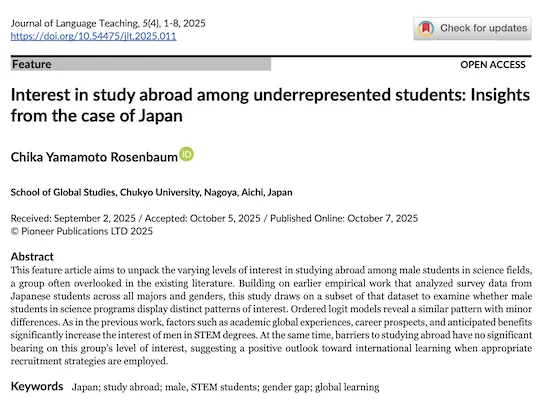Interest in study abroad among underrepresented students: Insights from the case of Japan
DOI:
https://doi.org/10.54475/jlt.2025.011Keywords:
Japan, study abroad, male, STEM students, gender gap, global learningAbstract
This feature article aims to unpack the varying levels of interest in studying abroad among male students in science fields, a group often overlooked in the existing literature. Building on earlier empirical work that analyzed survey data from Japanese students across all majors and genders, this study draws on a subset of that dataset to examine whether male students in science programs display distinct patterns of interest. Ordered logit models reveal a similar pattern with minor differences. As in the previous work, factors such as academic global experiences, career prospects, and anticipated benefits significantly increase the interest of men in STEM degrees. At the same time, barriers to studying abroad have no significant bearing on this group’s level of interest, suggesting a positive outlook toward international learning when appropriate recruitment strategies are employed.
References
Di Pietro, G. (2022a). Does an international academic environment promote study abroad? Journal of Studies in International Education, 26(1), 3–20. https://doi.org/10.1177/1028315320913260 DOI: https://doi.org/10.1177/1028315320913260
Di Pietro, G. (2022b). Changes in the study abroad gender gap: A European cross-country analysis. Higher Education Quarterly, 76(2), 436–459. https://doi.org/10.1111/hequ.12316 DOI: https://doi.org/10.1111/hequ.12316
Hansen, J., & Loucky, J. (2010). Global understanding through international study: Learning from experience at an American university. Journal of Osaka Jogakuin College, 40, 37–69.
Howard, L. (2014). Why study abroad? An analysis of Kobe Kaisei students’ rationale for studying abroad. Kobe Kaisei Review, 53, 11–15.
Iwaki, N. (2020). Determinants of Japanese students’ decision to engage in study abroad. Nagoya Journal of Higher Education, 20, 413–424.
Loberg, L. (2012). Exploring factors that lead to participation in study abroad [Doctoral dissertation, University of California, Los Angeles]. eScholarship. https://escholarship.org/uc/item/6jg575sg
Miller, S. (2017). Exploring men’s motivations for studying, and not studying, abroad. Academic Affairs Publications, 5. College of Saint Benedict and Saint John’s University. https://digitalcommons.csbsju.edu/academic_pubs/5
Nowlan, A., & Wang, R. (2018). Study abroad self-selection amongst first-year Japanese university students. Journal of International and Comparative Education, 7(2), 65–81. https://doi.org/10.14425/jice.2018.7.2.65 DOI: https://doi.org/10.14425/jice.2018.7.2.65
Pruitt, W. (2021). Academic experiences that impact the study abroad propensity of college students. International Research and Review: Journal of Phi Beta Delta, 11(1), 5–24.
Rosenbaum, C. Y. (2024). When English education isn’t what it seems: Outcomes from a pilot study in Japan. Journal of Language Teaching, 4(3), 11–16. https://doi.org/10.54475/jlt.2024.016 DOI: https://doi.org/10.54475/jlt.2024.016
Rosenbaum, C. Y., Iwaki, N., & Tatsumi, Y. (2025). What affects Japanese students’ initial interests in studying abroad? Empirical analysis on the complex nature of determinants. Discover Education, 4, 90. https://doi.org/10.1007/s44217-025-00467-w DOI: https://doi.org/10.1007/s44217-025-00467-w
Sponseller, A. C. (2021). Examining motivation to study abroad among Japanese undergraduates. Journal of Osaka Jogakuin College, 51, 255–279.
Stroud, A. H. (2010). Who plans (not) to study abroad? An examination of U.S. student intent. Journal of Studies in International Education, 14(5), 491–507. https://doi.org/10.1177/1028315309357942 DOI: https://doi.org/10.1177/1028315309357942
Vernon, A., Moos, C., & Loncarich, H. (2017). Student expectancy and barriers to study abroad. Academy of Educational Leadership Journal, 21(1), 1–9.
Walker, J. (2015). Student perception of barriers to study abroad (Honors thesis No. 1890). University of Central Florida STARS. https://stars.library.ucf.edu/honorstheses1990-2015/1890

Downloads
Published
Issue
Section
License
Copyright (c) 2025 Journal of Language Teaching

This work is licensed under a Creative Commons Attribution 4.0 International License.




